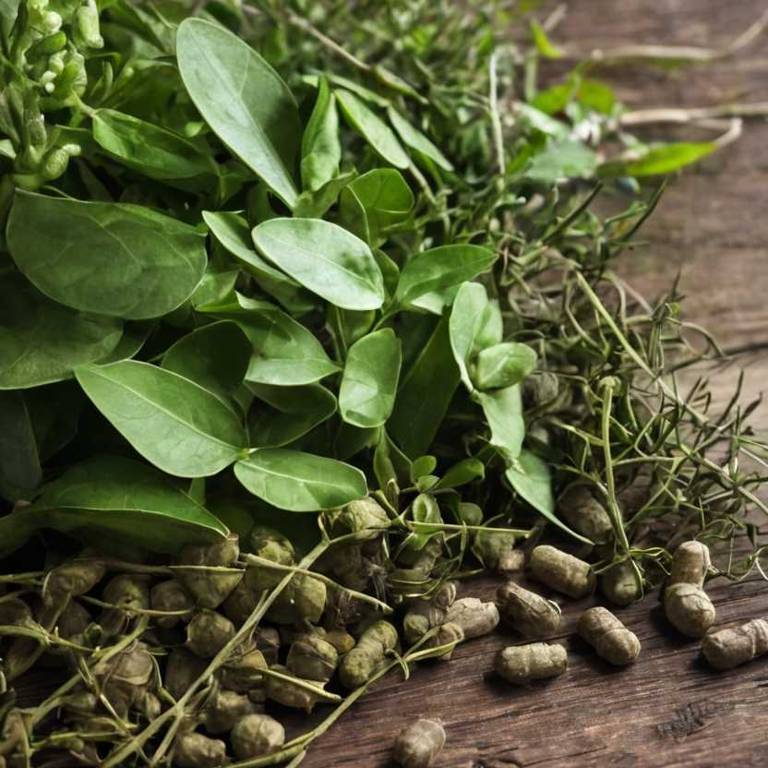Heartleaf Tinospora (Tinospora cordifolia)
Heartleaf Tinospora (Tinospora cordifolia) is a member of the Menispermaceae family, native to India, Southeast Asia, and Indonesia. Traditionally, its leaves, bark, and stems have been used for decoctions, powders, and infusions.
This herb is particularly valued for its anti-inflammatory, tonic, and bitter actions, and has a long history of use in ayurvedic medicine, traditional chinese medicine, and unani medicine.

Quick Facts / Key Information
| Common Name | Heartleaf Tinospora |
|---|---|
| Scientific Name | Tinospora cordifolia |
| Plant Family | Menispermaceae |
| Genus | Tinospora |
| Species | cordifolia |
| Native Range | India, Southeast Asia, Indonesia |
| Plant Parts Used | Leaves, Bark, Stems |
| Primary Medicinal Actions | Anti-Inflammatory, Tonic, Bitter |
| Primary Traditional Systems | Ayurvedic Medicine, Traditional Chinese Medicine, Unani Medicine |
| Historical Preparation Methods | Decoction, Powder, Infusion |
Botanical Identity
- Scientific Name
- Tinospora cordifolia
- Common Name
- Heartleaf Tinospora
- Synonyms / Alternative Names
- Guduchi, Indian Remedial Vine, Tinospora Vine
- Plant Family
- Menispermaceae
- Genus
- Tinospora
Botanical Description
- Growth Habit
- Perennial herbaceous plant.
- Height
- It typically reaches a height of 5 to 15 meters.
- Leaves
- Simple leaves with dark green upper surface and lighter green lower surface, featuring prominent stomatal bands along the midrib.
- Flowers
- Inflorescences are terminal panicles with small actinomorphic flowers having five white petals and five yellow stamens arranged in two whorls.
- Stems
- Climbing stems with opposite branching, glabrous surface, and persistent adventitious roots.
Traditional Uses / Historical Use
Traditional Systems
- Ayurvedic Medicine
- Traditional Chinese Medicine
- Unani Medicine
- Korean Traditional Medicine
Historical Preparation Methods
- Decoction
- Powder
- Infusion
- Poultice
Medicinal Actions
- Anti-inflammatory
- Historically regarded as a moderate anti-inflammatory, for irritation-related applications.
- Tonic
- Commonly referenced as a mild tonic, in whole-system applications.
- Bitter
- Traditionally described as a warming bitter, for flavor-based applications.
- Stimulant
- As described in traditional systems, a cooling stimulant, for vitality-related discussions.
Active Compounds
- Alkaloid
- Naturally occurring organic compounds commonly involved in plant defense.
- Flavonoid
- A chemical class commonly identified in plant tissues, especially flowers and leaves.
- Saponin
- Plant-derived compounds characterized by their soap-like properties.
- Tannin
- Plant-derived compounds known for their ability to bind proteins.
Modern Research Overview
Scientific research related to this plant is ongoing. This section will be expanded in the future to include summaries of phytochemical studies, laboratory research, and other relevant scientific literature as it becomes available.
Safety & Contraindications
- General Precautions
- Specific general precautions associated with this herb have not been well documented.
- Contraindications
- Specific contraindications associated with this herb have not been well documented.
- Allergies
- Information regarding allergic responses to this herb is limited.
- Drug Interactions
- There is insufficient evidence to determine whether this herb interacts with pharmaceutical drugs.
- Toxicity
- The use of this herb has been linked to reported toxic effects.
- Pregnancy & Breastfeeding
- Safety during pregnancy and breastfeeding has not been well documented.
Preparation & Usage Methods
- Infusion
- Dried or fresh plant parts are infused in hot water and consumed as a beverage.
- Decoction
- Decoctions are made by heating plant material in water for an extended time.
- Poultice
- This method uses direct contact between plant material and the skin.
- Powder
- This method converts dried plant material into a uniform powder.
- Extract
- Extracts are created by dissolving plant material in a suitable non-alcoholic medium.
Growing, Harvesting & Storage
Growing / Cultivation
- Soil
- Prefers loamy soil with moderately well-drained conditions. Typically grows best in organically rich soils.
- Sunlight
- Thrives in partial shade. Tolerates full sun to partial shade.
- Watering
- Prefers well-balanced moisture levels. Tolerates periodic dry conditions.
Medical Disclaimer
The information provided on this page is for educational and informational purposes only. It is not intended to diagnose, treat, cure, or prevent any medical condition. Always consult a qualified healthcare professional before using any herb for medicinal purposes.